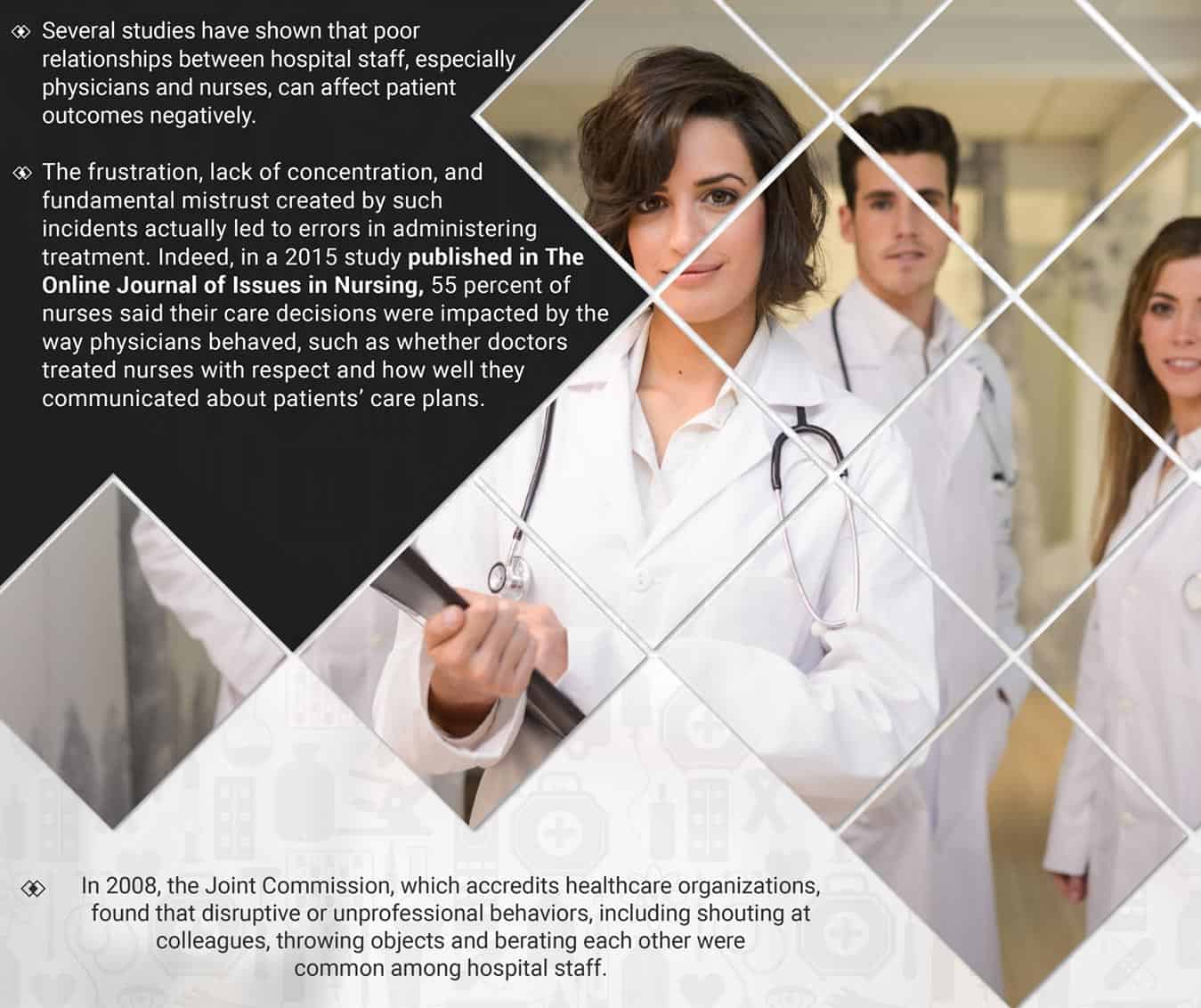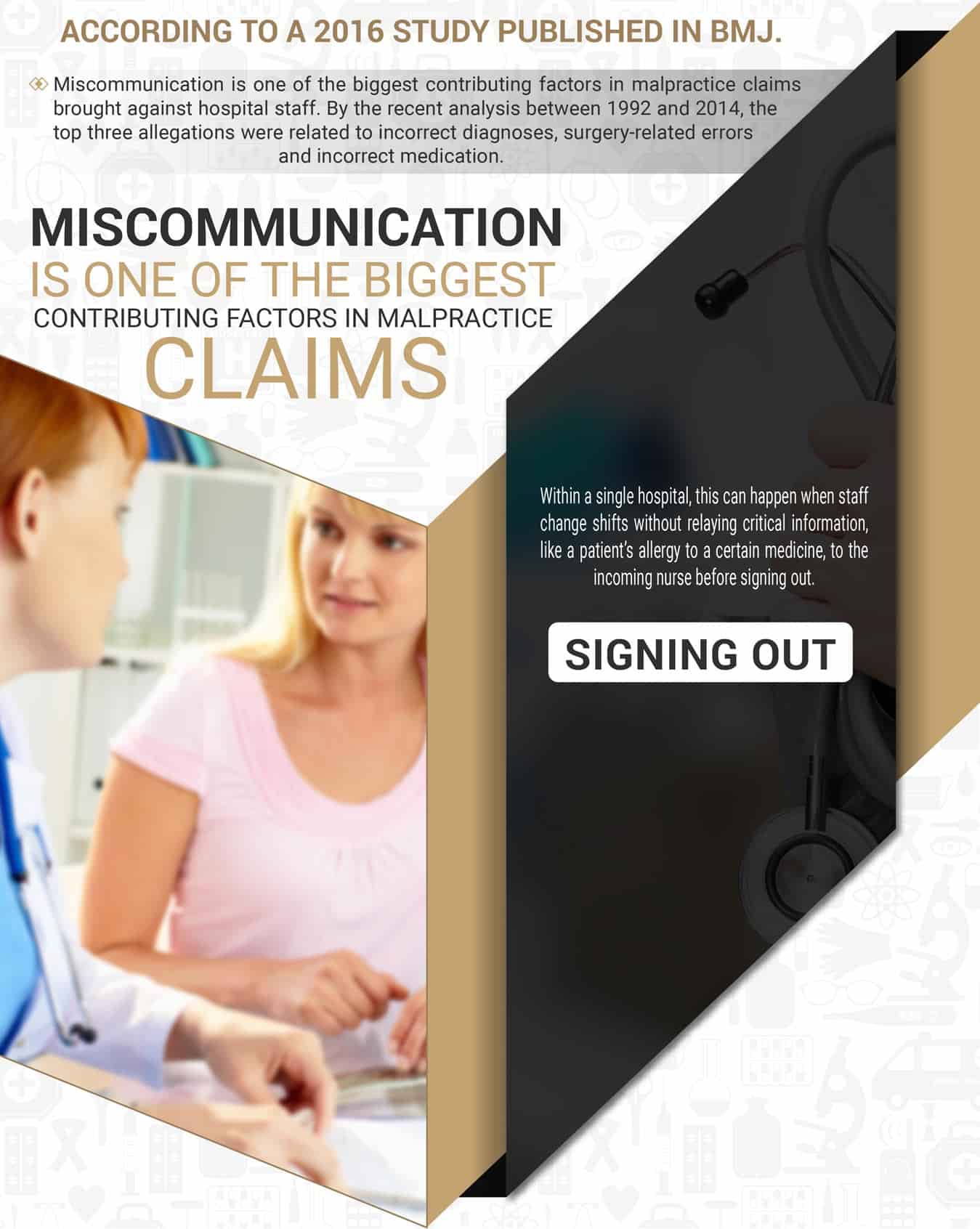The Increased Risk of Malpractice Allegations

THE UNTOLD SECRET
THE UNTOLD SECRET
HOW POOR
COMMUNICATION
LEADS TO MEDICAL MALPRACTICE
- It is a widely understood that poor coordination resulting from silos within the healthcare system reduce the quality of care and increase healthcare costs. But there is another serious, but often overlooked effect for physicians — the increased risk of malpractice allegations.
- Miscommunication is one of the biggest contributors to costly and dangerous medical mistakes. The number of deaths related to medical error at more than 250,000 each year.
- Part of the problem lies within the fragmented healthcare system in the United States, which hinders effective coordination between providers, insurers and patients.
HOW INTERNAL SILOS IN HEALTHCARE TEAMS AFFECT PATIENT SAFETY
![]() In a single hospital, where teams of physicians and nurses work together to treat patients, poor interpersonal relationships and ineffective communication often inhibit the effective coordination of care.
In a single hospital, where teams of physicians and nurses work together to treat patients, poor interpersonal relationships and ineffective communication often inhibit the effective coordination of care.

![]() When factors like long shifts, constant rotations, clinical variation, time constraints, administrative burden, and life-or-death situations combine, medical staff may take out their frustrations on each other.
When factors like long shifts, constant rotations, clinical variation, time constraints, administrative burden, and life-or-death situations combine, medical staff may take out their frustrations on each other.
![]() According to a landmark study in Mayo Clinic Proceedings, Increasing demands of electronic medical record (EMR) keeping also contribute heavily to “physician burnout,” which more than half of doctors experience on a daily basis. One of the underlying problems that most EMRs in the US today have been originally designed to be utilized for billing purposes rather than to enhance clinical care and coordination of care.
According to a landmark study in Mayo Clinic Proceedings, Increasing demands of electronic medical record (EMR) keeping also contribute heavily to “physician burnout,” which more than half of doctors experience on a daily basis. One of the underlying problems that most EMRs in the US today have been originally designed to be utilized for billing purposes rather than to enhance clinical care and coordination of care.
The Nurse-Physician Relationship

![]() Several studies have shown that poor relationships between hospital staff, especially physicians and nurses, can affect patient outcomes negatively.
Several studies have shown that poor relationships between hospital staff, especially physicians and nurses, can affect patient outcomes negatively.
![]() The frustration, lack of concentration, and fundamental mistrust created by such incidents actually led to errors in administering treatment. Indeed, in a 2015 study published in The Online Journal of Issues in Nursing, 55 percent of nurses said their care decisions were impacted by the way physicians behaved, such as whether doctors treated nurses with respect and how well they communicated about patients’ care plans.
The frustration, lack of concentration, and fundamental mistrust created by such incidents actually led to errors in administering treatment. Indeed, in a 2015 study published in The Online Journal of Issues in Nursing, 55 percent of nurses said their care decisions were impacted by the way physicians behaved, such as whether doctors treated nurses with respect and how well they communicated about patients’ care plans.
![]() In 2008, the Joint Commission, which accredits healthcare organizations, found that disruptive or unprofessional behaviors, including shouting at colleagues, throwing objects and berating each other were common among hospital staff.
In 2008, the Joint Commission, which accredits healthcare organizations, found that disruptive or unprofessional behaviors, including shouting at colleagues, throwing objects and berating each other were common among hospital staff.
The Role of Communication Errors in Medical Malpractice
![]() Poor communication between medical staff is not just a problem for workplace morale: it can lead to patient injury and death. Indeed, medical error may be the third most common cause of death in the United States, behind cardiovascular disease and cancer. What’s worse, most of these mistakes go unreported, according to a 2016 study published in BMJ.
Poor communication between medical staff is not just a problem for workplace morale: it can lead to patient injury and death. Indeed, medical error may be the third most common cause of death in the United States, behind cardiovascular disease and cancer. What’s worse, most of these mistakes go unreported, according to a 2016 study published in BMJ.
ACCORDING TO A 2016 STUDY PUBLISHED IN BMJ.
![]() Miscommunication is one of the biggest contributing factors in malpractice claims brought against hospital staff. By the recent analysis between 1992 and 2014, the top three allegations were related to incorrect diagnoses, surgery-related errors and incorrect medication.
Miscommunication is one of the biggest contributing factors in malpractice claims brought against hospital staff. By the recent analysis between 1992 and 2014, the top three allegations were related to incorrect diagnoses, surgery-related errors and incorrect medication.
MISCOMMUNICATION IS ONE OF THE BIGGEST CONTRIBUTING FACTORS IN MALPRACTICE CLAIMS
Within a single hospital, this can happen when staff change shifts without relaying critical information, like a patient’s allergy to a certain medicine, to the incoming nurse before signing out.
Reducing risk through better coordination of care & communication
![]() A multifactorial problem needs a multifactorial solution. One key solution for breaking down the existing silos and improving patient outcomes is an integrated care model, which has received a lot of attention recently with the push toward value-based care under the Affordable Care Act.
A multifactorial problem needs a multifactorial solution. One key solution for breaking down the existing silos and improving patient outcomes is an integrated care model, which has received a lot of attention recently with the push toward value-based care under the Affordable Care Act.
![]() Models such as the Perioperative Surgical Home (PSH) which is pioneered by Dr. Zeev Kain tackle many of the inefficiencies and barriers to communication that results from the current fragmentation in the system. Another important component in radically transforming the problematic organizational structures in hospitals is greater transparency among various stakeholders. Online rating of hospitals and publications of specific comments are a step in the right direction. One fundamental change, however, is still needed.
Models such as the Perioperative Surgical Home (PSH) which is pioneered by Dr. Zeev Kain tackle many of the inefficiencies and barriers to communication that results from the current fragmentation in the system. Another important component in radically transforming the problematic organizational structures in hospitals is greater transparency among various stakeholders. Online rating of hospitals and publications of specific comments are a step in the right direction. One fundamental change, however, is still needed.


We need hospitals to publish more outcome data in a way that will enable the patient to make the right choices when they choose their doctor. The public should also be aware of the National Practitioner Data Bank (NPDB) where Medical Malpractice Payment Reports (MMPR) and Adverse Action Reports (AAR) reported on all practitioners by location (https://www.npdb.hrsa.gov/resources/npdbstats/npdbStatistics.jsp).






washington dc cbd
Posted at 07:31h, 24 NovemberOaHfor Merely wanna remark that you have a very decent internet site , I enjoy the design it really stands out.